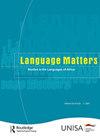汤加在津巴布韦振兴面临的障碍和挑战
IF 0.8
3区 文学
0 LANGUAGE & LINGUISTICS
引用次数: 1
摘要
语言振兴计划经常面临许多社会经济和政治挑战,如果不加以缓解,可能会压倒他们。本文以支持派、悲观派和反对派三种语言复兴思潮为例,检视内部和外部挑战如何影响濒临灭绝的津巴布韦汤加语社群的语言复兴计划。它认为濒临灭绝的语言群体经常被误解为同质的,愿意为自己的语言而战斗和牺牲。然而,这项研究揭示了濒危语言社区是复杂的异质实体,其中相互竞争的利益可能危及振兴过程。这项研究确定了阻碍汤加振兴进程的六个因素。最重要的因素是缺乏标准化的汤加语,津巴布韦歧视性语言政策的遗留问题,以及政治家的反对。本文章由计算机程序翻译,如有差异,请以英文原文为准。
Obstacles and Challenges Confronting Tonga Revitalisation in Zimbabwe
Abstract Language revitalisation initiatives are often faced with numerous socio- economic and political challenges which, if not mitigated, could overwhelm them. Using three schools of thought on language revitalisation, namely the Proponents, the Pessimists, and the Opponents, this article examines how internal and external challenges affected the language revitalisation initiative of the endangered Tonga speech community in Zimbabwe. It argues that endangered speech communities are often misconstrued as homogeneous and willing to fight and die for their languages. This study, however, reveals that endangered speech communities are intricate heterogeneous entities in which competing interests may jeopardise the revitalisation process. The study identifies six factors which obstructed the process of Tonga revitalisation. The most significant factors were the lack of a standardised variety of Tonga, the legacy of discriminatory language policies in Zimbabwe, and the opposition of politicians.
求助全文
通过发布文献求助,成功后即可免费获取论文全文。
去求助
来源期刊

Language Matters
Multiple-
CiteScore
1.20
自引率
0.00%
发文量
19
期刊介绍:
The purpose of Language Matters is to provide a journal of international standing with a unique African flavour focusing on multilingualism in Africa. Although the journal contributes to the language debate on all African languages, sub-Saharan Africa and issues related to multilingualism in the southern African context are the journal’s specific domains. The journal seeks to promote the dissemination of ideas, points of view, teaching strategies and research on different aspects of African languages, providing a forum for discussion on the whole spectrum of language usage and debate in Africa. The journal endorses a multidisciplinary approach to the study of language and welcomes contributions not only from sociolinguists, psycholinguists and the like, but also from educationalists, language practitioners, computer analysts, engineers or scholars with a genuine interest in and contribution to the study of language. All contributions are critically reviewed by at least two referees. Although the general focus remains on multilingualism and related issues, one of the three issues of Language Matters published each year is a special thematic edition on Language Politics in Africa. These special issues embrace a wide spectrum of language matters of current relevance in Southern Africa.
 求助内容:
求助内容: 应助结果提醒方式:
应助结果提醒方式:


